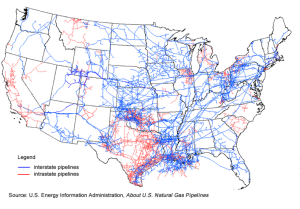The project will enhance pipeline inspection and maintenance through advanced modeling, data analytics, and remote sensing technologies.
Department of Civil and Environmental Engineering (CEE) professor Hao Wang and his team have been awarded a three-year $1 million Competitive Academic Agreement Program (CAAP) grant from U.S. Department of Transportation – Pipeline and Hazardous Materials Safety Administration (DOT-PHMSA).
The nationwide PHMSA CAAP grant, whose recipients include Rutgers and five other universities this year, is funding projects and activities designed to ensure that the nation’s pipelines are safe, reliable, and environmentally sound.

Map of US interstate and intrastate natural gas pipelines.
Stretching to 3.4 million miles, the nation’s pipeline transportation system is the largest in the world. “During its service life, the integrity of a natural gas pipeline faces various threats ranging from harsh environments, material degradation, extreme hazards, and repeated stress from loading,” says Hao Wang.
The CAAP grants fund university research that will improve the safety of carbon dioxide, hydrogen, and older, high-risk pipelines with improved pipeline coatings. Additionally, they will further the understanding of the risks associated with a proximity to pipeline incidents.
According to Wang, while in-situ inspections, and regular maintenance and repair are critical steps for fostering pipeline safety, his team’s project seeks to develop an “integrated methodology for cathodic protection of natural gas pipes to prevent corrosion using advanced modeling, data analytics, and remote sensing.”
The new award relates to Wang’s work on several other PHMSA-funded pipeline projects in the past, including an ongoing project that explores pipeline risk management using Artificial Intelligence-enabled performance prediction and decision-making. This award also enhances the research activities in the broad area of transportation infrastructure conducted at the Center for Advanced Infrastructure and Transportation (CAIT), A member of the USDOT’s University Transportation Center (UTC) program
.“This award,” explains Wang, “allows us to develop new knowledges and technologies to reduce the risks of pipeline incidents due to external corrosion and improve pipeline integrity management. It also provides an opportunity for us to engage, inspire, and train graduate and undergraduate students through research – and prepare them for future careers in the pipeline industry.”
The research team also includes professor and CEE department chair Nenad Gucunski, CEE assistant professor Roger Wang, as well as associate professor Qixin Zhou from the University of Akron.
This story originally appeared on the Rutgers Department of Civil and Environmental Engineering website.

